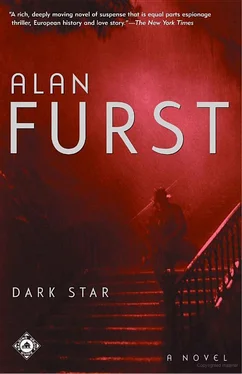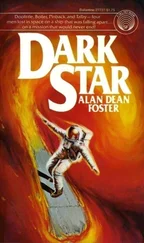Alan Furst - Dark Star
Здесь есть возможность читать онлайн «Alan Furst - Dark Star» весь текст электронной книги совершенно бесплатно (целиком полную версию без сокращений). В некоторых случаях можно слушать аудио, скачать через торрент в формате fb2 и присутствует краткое содержание. Жанр: Шпионский детектив, на английском языке. Описание произведения, (предисловие) а так же отзывы посетителей доступны на портале библиотеки ЛибКат.
- Название:Dark Star
- Автор:
- Жанр:
- Год:неизвестен
- ISBN:нет данных
- Рейтинг книги:3 / 5. Голосов: 1
-
Избранное:Добавить в избранное
- Отзывы:
-
Ваша оценка:
- 60
- 1
- 2
- 3
- 4
- 5
Dark Star: краткое содержание, описание и аннотация
Предлагаем к чтению аннотацию, описание, краткое содержание или предисловие (зависит от того, что написал сам автор книги «Dark Star»). Если вы не нашли необходимую информацию о книге — напишите в комментариях, мы постараемся отыскать её.
Dark Star — читать онлайн бесплатно полную книгу (весь текст) целиком
Ниже представлен текст книги, разбитый по страницам. Система сохранения места последней прочитанной страницы, позволяет с удобством читать онлайн бесплатно книгу «Dark Star», без необходимости каждый раз заново искать на чём Вы остановились. Поставьте закладку, и сможете в любой момент перейти на страницу, на которой закончили чтение.
Интервал:
Закладка:
Szara obliged. His talent, set alight by alcohol, burned and flamed. A certain lady in, ah, Budapest. Gold earrings like a Gypsy-but no Gypsy, an aristocrat who affected British tweeds and wore a silk scarf, the color of a cloud, knotted at her throat. Hair dark red, like autumn, Magyar cheekbones, long, delicate fingers. Szara, a good storyteller, took his time. He cast about for a name, came up with Magda, thought it commonplace, but could do no better. Magda, then. The husband was a lout, ignorant, nas kulturny -a man of no culture who exported wool. So Szara had the wife. Where. In the stables? On straw? No, in the apartment, a cinq-a-sept affaire by lamplight. The husband was … hunting wild boar. Szara watched the level in the brandy bottle on the table. As it descended, so did the pants. And there, the most delicate little triangle, also dark red, like autumn. And fine blue veins beneath the milky skin. The green silk divan was ruined. Khelidze’s ears were scarlet. Later it came to Szara that he’d been describing his private musings on a particular secretary he sometimes encountered at the Yugoslav Ministry of Posts and Telegraph.
Khelidze was drunk. He polished his glasses with a handkerchief, his eyes watery and vague. Yes well, he said, one sometimes imagined. For himself, well it was all a matter of taste in this life wasn’t it. He had, in all confidence, “a perfect dumpling” in Ostend, resident at the Hotel Groenendaal in the street of the same name. “A fat little thing. They dress her up like a child, with a bow and a party dress of white satin. My God, Andre Aronovich, how we carry on! Such a grand little actress she is, pouting, sulking, tossing her curls about, whining for cookies and milk. But she can’t have them. No, definitely not! Because, well, there’s something she must do first. Oh no, she wails. Oh yes.” Khelidze sat back in his chair, put his glasses on, and sighed. “A marvel,” he said. “She’ll suck ten years off a man’s life.”
By the time they went singing off to bed, holding each other upright in the passageway that rolled with the motion of the ship, the dark surface of the sea was turning gray with dawn.
Szara’s hotel in Ostend was all flowers: on the wallpaper, heavy cabbage roses on a somber field; on the bedspread, a jungle of vines and geraniums; and in the park below his window, frostbitten asters, dusty purple and faded pink. And the place was called the Hotel Blommen. Ignore this stern, northern, Flemish light, here we have flowers. Szara stood at the window and listened to the foghorns from the harbor and the rattle of dead leaves as the wind swept them through the deserted park. He folded the note and creased it between thumb and index finger: “M. Van Doorn will be visiting the Hotel Groenendaal.” He put it in an envelope, licked and sealed it, and wrote “M. Brun” on the front. He didn’t know what it meant, why a journalist was asked to report on a Comintern operative. But there was a reason, a single reason that lately explained anything you wanted explained: the purge had shuddered to a halt in ‘36, now another had begun. The first had taken politicians, Stalin’s opposition, and more than a few journalists. This one, it was said, had gone to work on the intelligence services themselves. Szara, beginning in 1934, had learned to live with it: he was careful what he wrote, what he said, who he saw. Not yet what he thought- not yet, he told himself now and then, as though it needed to be said. He took the note down to the reception desk and handed it to the old man behind the counter.
The knock on the door was discreet, two taps with a knuckle. Szara had fallen asleep, still wearing shirt and trousers, on top of the bedspread. He sat up and pulled the damp shirt away from his back. It was a gray dawn outside the window, fog hanging in the tree branches. He looked at his watch-a little after six. The polite knock came a second time and Szara felt his heart accelerate. A knock at the door meant too much, nobody did that in Moscow anymore, they phoned first. “Yes, a moment,” he said. Somewhere within, a small, urgent voice: out the window. He took a breath, staggered to his feet, and opened the door. It was the old man from the hotel desk, holding a coffee and a newspaper. Had he left a call to be woken up? No.
“Good morning, good morning,” said the old man tartly. It never really was, but one had to pretend. “Your friend was kind enough to leave you the newspaper,” he added, putting it at the foot of the bed.
Szara fumbled for change and handed over a few coins. Drachmas, he thought. He’d bought Belgian francs in Athens; where were they? But the old man seemed happy enough, thanked him and left. The coffee was cooler than he would have liked, the boiled milk a little sour, but he was grateful for it. The front page of the newspaper was devoted to anti-Jewish riots that had broken out in Danzig, with a photo of shouting, black-shirted Nazis. In Spain the Republican government, under pressure from Franco’s columns, had fled from Valencia to Barcelona. On page 6, the misfortunes of Ostend’s soccer team. Printed down the margin in pen, in a fine Cyrillic hand, were detailed instructions for a noon meeting. The “small favor” had started to grow.
Szara walked down the hall, locked the door of the bathroom, and started to wash. The instructions in the newspaper frightened him; he was afraid of being forced into a car and taken away. The purge sometimes worked like that-the security apparat worked quietly when it took public figures. Senior NKVD officers were called to meetings in small towns just outside Moscow, then arrested as they got off the train, a tactic that kept friends and family from trying to intervene. A foreign country, he reasoned, would be even more convenient. Should he run? Was now the time? There was a part of him that thought so. Go to the British consulate, it said. Fly for your life. Call the friends in Moscow who protect you. Buy a gun. Meanwhile, he shaved.
Then he sat in the park, where a nursemaid with a baby carriage flirted with him. Go with her, he told himself, hide in her bed. She will do anything you want. Perhaps it was true. He very well knew, at the age of forty, somewhat past illusion, what she saw. The longish black hair he combed back with his fingers, the tight line of the jaw, a concentration of personality in the eyes. These were hooded, knowing, of a gray-green sea color that women had more than once called “strange,” and often read as both expectant and sorrowful, like dogs’ eyes. His features were delicate, skin colorless, made to seem pallid by a permanent beard shadow. It was, taken altogether, a sad, attentive presence, anxious for happiness, certain of disappointment. He dressed the role of worldly intellectual, favoring soft clothing: thick gray cotton shirts, monochromatic ties in the somber tones of basic colors. He was, in the world’s mirror, a man you could take seriously, at least for a time. Then, later, there would be affection or intense dislike, a strong reaction whichever way it went.
The nursemaid, in a starched cap, plain, hand mindlessly rocking the carriage where some other woman’s baby slept, had no doubts at all. He need only rescue her, from boredom, servitude, chapped hands, and she would do whatever was necessary. Below a broad forehead her eyes were frank. Don’t be frightened. I can fix anything.
Just before ten-thirty he stood, pulled his raincoat tightly about him, and walked away. Glancing back, he easily read her expression: Then no? Stupid man.
A series of tram lines took him to a neighborhood of worker tenements, the narrow streets smelled like fish, urine, fried onions. The November day was cool in the shadow of the buildings. Was he followed? He thought not. They had something better, a kind of invisible cable, the method the psychologist Pavlov used with laboratory animals. It was called-he had to look for the word-conditioning. His last day on earth, yet he did what he was told. His mind stood off and watched the scene: a man of intellect, independence, delivering himself to the apparat. Pitiful. Contemptible. Szara glanced at his watch. He didn’t want to be late.
Читать дальшеИнтервал:
Закладка:
Похожие книги на «Dark Star»
Представляем Вашему вниманию похожие книги на «Dark Star» списком для выбора. Мы отобрали схожую по названию и смыслу литературу в надежде предоставить читателям больше вариантов отыскать новые, интересные, ещё непрочитанные произведения.
Обсуждение, отзывы о книге «Dark Star» и просто собственные мнения читателей. Оставьте ваши комментарии, напишите, что Вы думаете о произведении, его смысле или главных героях. Укажите что конкретно понравилось, а что нет, и почему Вы так считаете.












